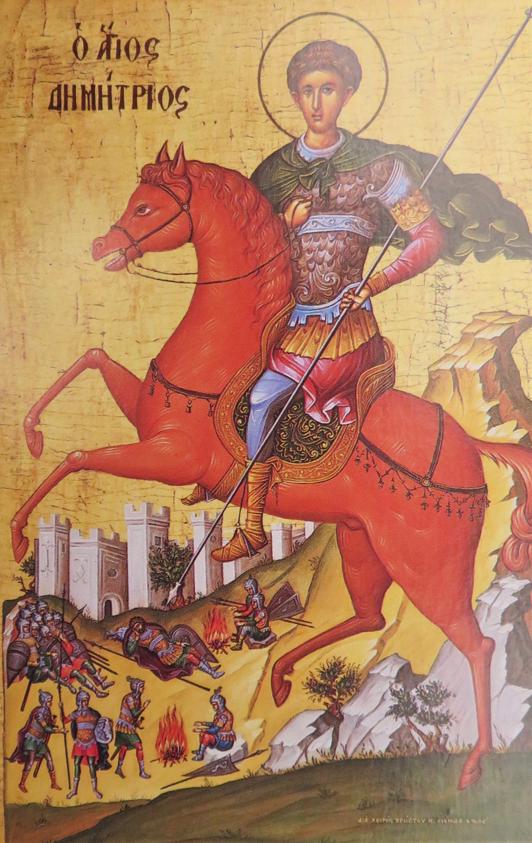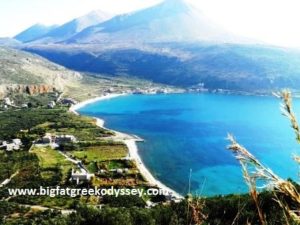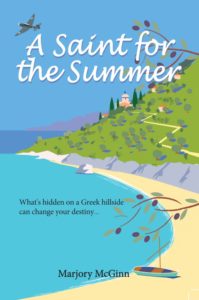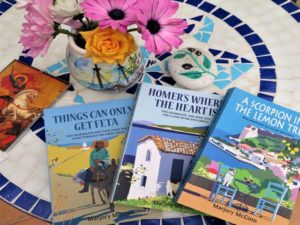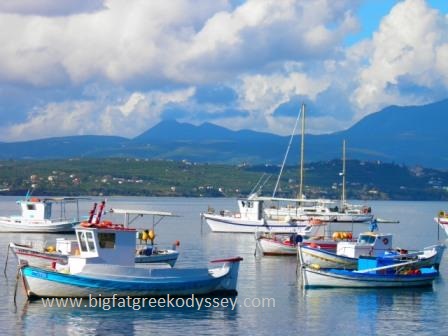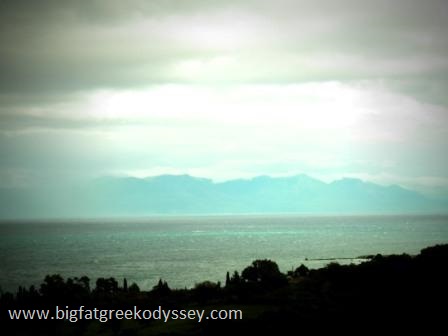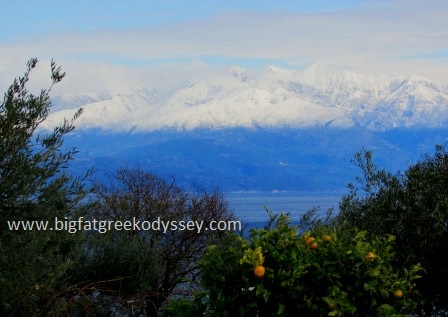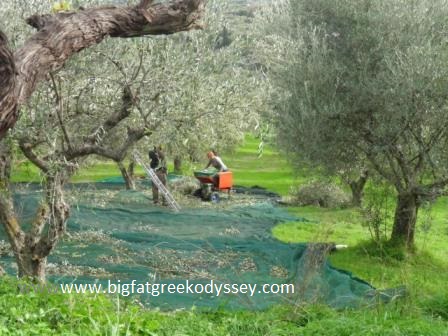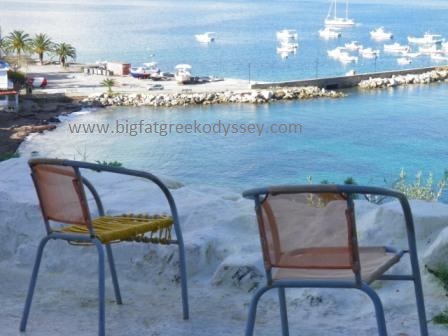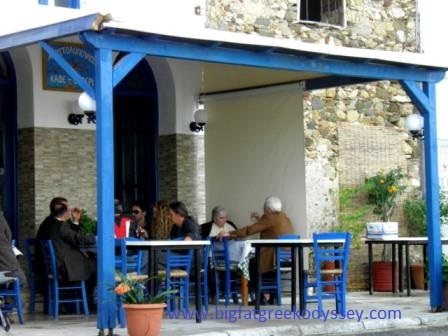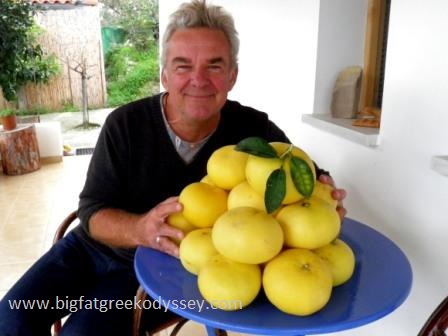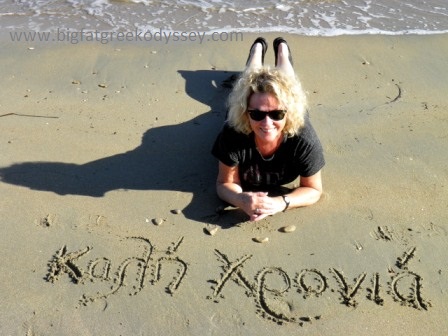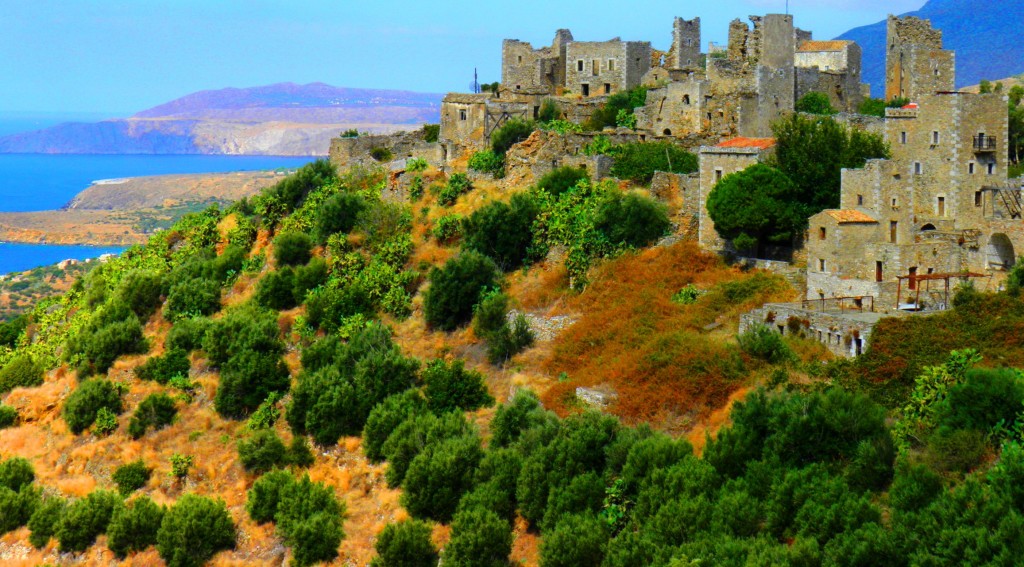THIS Saturday is the feast day of Ayios Dimitrios (Saint Dimitrios), pictured above in his usual guise, a jaunty character in a green cape, riding a sorrel-coloured horse.
It’s a big feast day in Greece (October 26) and the ‘name day’ for anyone with the moniker Dimitris, Dimitrios, or Dimitra for women. There will be a service early at churches named after the saint and then usually a yiorti, a celebration, nearby, especially in rural areas.
I’ve featured a few of these feast days and celebrations in my books as well as the local characters who frequented them. They are one of the best ways for foreigners to get a unique insight into Greek life with some of its pomp but mostly its spontaneity and eccentricity. It’s Greek people in their own world, enjoying the simple pleasures of village and family life with a rural papas, priest, or two in the mix as well. Tables will be spread out under the olive trees, as it was in the hillside village of Megali Mantineia, where we spent our first year in the southern Peloponnese. Locally sourced goat or lamb is often roasted in the village fournos (woodfired oven), or a spit-roast barbecue set up, or food brought from local tavernas. It’s always a nice occasion, unless you’re vegan perhaps!
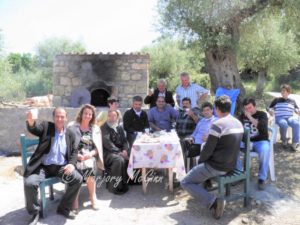
Villagers, and two local priests, enjoying a yiorti celebration in the southern Peloponnese in front of a mad, smoking fournos
Ayios Dimitrios was a martyr saint who, in the 4th century AD, was imprisoned and tortured for helping the citizens of Thessaloniki in northern Greece to rise up against the pagan teachings of the Romans. The feast day of Ayios Dimitrios has an added charm because if the weather has turned especially warm in the last two weeks of October, the Greeks call this The Little Summer of Saint Dimitrios. It’s a mellow, euphoric end to the summer season. Traditionally, October us the time for farmers to bring their flocks down from the hills to lower pastures for winter grazing, so the Little Summer is always a welcome occurrence.
The Little Summer of S D featured significantly in my first novel A Saint For The Summer. The Saint in the title has a few different meanings in the narrative but the main allusion is to Saint Dimitrios because his feast day celebration in a Taygetos mountain village is instrumental in the plot, bringing an intriguing World War II mystery to its nail-biting conclusion.
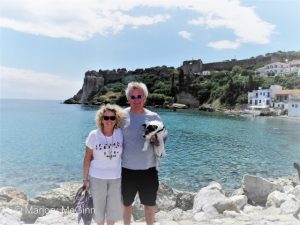
Jim, Marjory and Wallace in the town of Koroni, one of the places featured in Marjory’s Greek trilogy
In my three travel memoirs, I describe other saints’ days because when we first went to the southern Peloponnese on our four-year odyssey we never said ‘no’ to these occasions. St Dimitrios was a favourite because my husband Jim was given the name Dimitris (the Greek equivalent) by villagers, and I was christened early on as Margarita by my goat farmer friend Foteini because she couldn’t pronounce my real name. These names stuck the whole time we were in Greece and seem to fire up again every time we return.
The feast day celebrations were always convivial and Greeks were generous in embracing outsiders in what is essentially a very traditional Greek day. We had good company, great local cuisine and plenty of wine and gossip. More importantly, as foreigners, we learnt a lot from these celebrations.
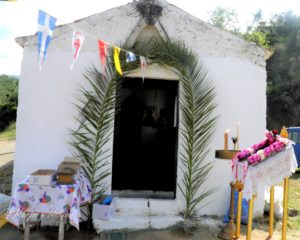
The tiny chapel of Ayios Yiorgos (above) in the hills behind the village of Megali Mantineia with its flower decked icon. A centuries-old fresco of St George in a Mani monastery (below) 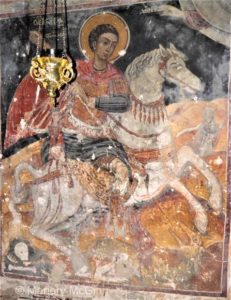
One memorable celebration was for the feast day of Ayios Yiorgos (St George), possibly the biggest of the saints’ celebrations in Greece. St George was another great martyr saint and a tribune living in the first century AD who is always depicted on his white horse, spearing a dragon-like interloper. You can just see the beast above at the bottom of the icon where age and water damage have diluted the colours.
It was at this celebration in 2011 at a small chapel in the hills above Megali Mantineia that we met a businessman called Tassos over lunch who was curious about our odyssey in rural Greece in the midst of the economic crisis.
“Why come to live in Greece now?” he asked. “If weather and the beach is the main reason, there are sunnier and easier places to live than Greece.”
It was hard to convince him that it was Greece we wanted for this mid-life odyssey and nowhere else. Still puzzled, he then asked: “What do you really seek to find, my friends, in our country that you cannot find in your own?”
It was a very good question. What indeed? And the question remained with me throughout my years in Greece, informing my own search for meaning and fulfilment in this country as well as informing my writing. The scene with Tassos found its way into an early chapter in the second memoir, Homer’s Where The Heart Is, as we took on more adventures in southern Greece and experienced the chaos of an increasingly bitter crisis.
His query is something that many expats ask themselves, if just in the form of ‘What is it about this complex country that I’ve fallen in love with?’ Of course, there’s no simple answer to this. For me, there were many things I sought and found, and loved, about Greece, as you will discover if you read Homer, and the other memoirs of course.
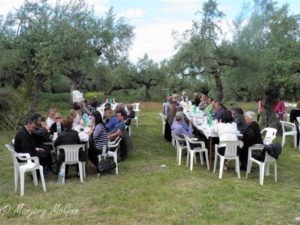
For the feast day of St George, tables spread under the olive trees for villagers, and the priest (left), of Megali Mantineia
It could be that being able to access these unique celebrations on feast days, like the one for Saint Dimitrios, is part of it, an ability to enjoy simple pleasures in beautiful surroundings, embraced by warm, inclusive communities. In our four years in southern Greece, in the Mani and later in the nearby Messinian peninsula, we went to many of these feast days. They were all different in location and intensity, and we enjoyed every one of them.
If you’re in Greece and you get the chance to attend a feast day, or indeed any of the other larger celebrations of Easter and August, do go, and also to the church services preceding them. You don’t have to be especially religious to attend because the services offer unique insights into much more than just the Orthodox faith. It is here that you gain insight into Greek traditions and social life, and rituals that are gloriously diverting and rooted in the Byzantine world. These are rituals that have changed little in the past 500 years. You won’t be disappointed. And Greek people, I promise you, will admire your interest and curiosity.
Χρονια Πολλα!
Happy Name Day/Feast Day!
For more information about Marjory’s books including the novel A Saint For The Summer and the Peloponnese trilogy, above, please visit Marjory’s Amazon page or the books page on our website www.bigfatgreekodyssey.com
Or visit Marjory’s books page on Facebook
Thanks for dropping by. All comments are gratefully received. Just click on the ‘chat’ bubble at the top of this page.
© All rights reserved. All text and photographs copyright of the authors 2010-2019. No content/text or photographs may be copied from the blog without the prior written permission of the authors. This applies to all posts on the blog.
